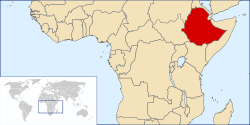
Ethiopia is a landlocked sovereign country located in the Horn of Africa. [1] It is bordered by Eritrea to the north, Sudan to the west, South Sudan to the south-west, Kenya to the south, Somalia to the east and Djibouti to the north-east. Ethiopia is one of the oldest countries in the world [2] and Africa's second-most populous nation. [3] Ethiopia has yielded some of humanity's oldest traces, [4] making the area important in the history of human evolution. Recent studies claim that the vicinity of present-day Addis Ababa was the point from which human beings migrated around the world. [5] [6] [7] Ethiopian dynastic history traditionally began with the reign of Emperor Menelik I in 1000 BC. [8] [9] The roots of the Ethiopian state are similarly deep, dating with unbroken continuity to at least the Aksumite Empire (which adopted the name "Ethiopia" in the 4th century) and its predecessor state, D`mt (with early 1st millennium BC roots). [10] [11] After a period of decentralized power in the 18th and early 19th centuries known as the Zemene Mesafint ("Era of the Judges/Princes"), the country was reunited in 1855 by Kassa Hailu, who became Emperor Tewodros II, beginning Ethiopia's modern history. [12] [13] [14] [15] Ethiopia's borders underwent significant territorial expansion to its modern borders for the rest of the century, [16] [17] [18] especially by Emperor Menelik II and Ras Gobena, culminating in its victory over the Italians at the Battle of Adwa in 1896 with the military leadership of Ras Makonnen, and ensuring its sovereignty and freedom from colonization. [17] [18] It was occupied by Benito Mussolini's Fascist Italy from 1936 to 1941, [19] ending with its liberation by British Empire and Ethiopian Patriot forces. Its eastern border also changed in 1950 from the former 1908 Convention Line to the subsequent provisional administrative line. [20]
Contents
- General reference
- Geography of Ethiopia
- Environment of Ethiopia
- Regions of Ethiopia
- Demography of Ethiopia
- Government and politics of Ethiopia
- Branches of the government of Ethiopia
- Foreign relations of Ethiopia
- Law and order in Ethiopia
- Military of Ethiopia
- Local government in Ethiopia
- History of Ethiopia
- Culture of Ethiopia
- Art in Ethiopia
- Sports in Ethiopia
- Economy and infrastructure of Ethiopia
- Education in Ethiopia
- Health in Ethiopia
- See also
- References
- External links




